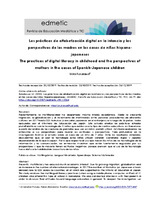The practices of digital literacy in childhood and the perspectives of mothers in the cases of Spanish-Japanese children
Las prácticas de alfabetización digital en la infancia y las perspectivas de las madres en los casos de niños hispanojaponeses
Autor
Fukukawa, Misa
Editor
UCOPressFecha
2020Materia
MultilingüismoLengua minoritaria
Aprendizaje
Sistema multimedia
Multilingualism
Minority language
Learning
Multimedia system
METS:
Mostrar el registro METSPREMIS:
Mostrar el registro PREMISMetadatos
Mostrar el registro completo del ítemResumen
Recientemente la multiliteracidad ha despertado mucho interés académico. Dada la creciente migración, la globalización y el incremento de matrimonios entre personas procedentes de diferentes culturas, en 2017 había 203 Hoshukos (o escuelas japonesas en el extranjero) a lo largo de 56 países, todas apoyadas por el Ministerio de Educación de Japón. Este estudio analiza las prácticas letradas plurialfabéticas con la tecnología de 11 niños que asisten a este tipo de centros educativos, en Barcelona, a partir del análisis de las capturas de pantallas que ven en móvil, portátil y iPad. Así mismo realizamos las entrevistas a sus progenitores para revelar sus actitudes y perspectivas. Para profundizar en la investigación hicimos el estudio sobre un caso de un niño de 7 años. Entre los resultados obtenidos, descubrimos que al usar la tecnología estos niños utilizan catalán, castellano, inglés y japonés dependiendo de lo que busquen. Por lo que respecta al uso que hacen los niños de las tecnologías de la información y la comunicación, las entrevistas muestran que están fuertemente reguladas por sus progenitores y que la mayoría tienen actitudes negativas, porque piensan que el uso de la tecnología hace daño a la habilidad de la escritura de los niños. Recently, multiliteracy has aroused much academic interest. Due to growing migration, globalisation and an increase in the number of international marriages, in 2017 the number of Hoshukos (or Japanese schools abroad) rose to 203, across 56 countries, all of which are supported by the Ministry of Education of Japan. This study analyses the multilingual literacy practices (when using a mobile phone, computer, or iPad) of 11 children who attend this type of school in Barcelona. We also conducted interviews with their parents in order to discover their attitudes toward language education in general. To deepen the investigation, we also carried out a case study on a 7-year-old boy. From the results we obtained, it was discovered that when using technology these children utilize Catalan, Spanish, English and Japanese, depending on the nature of the activity. With regard to the children's use of technologies interviews, showed that they are heavily regulated by their parents and most parents have a negative opinion about children using technology on a daily basis because they suppose that it would hamper children's writing skills.

